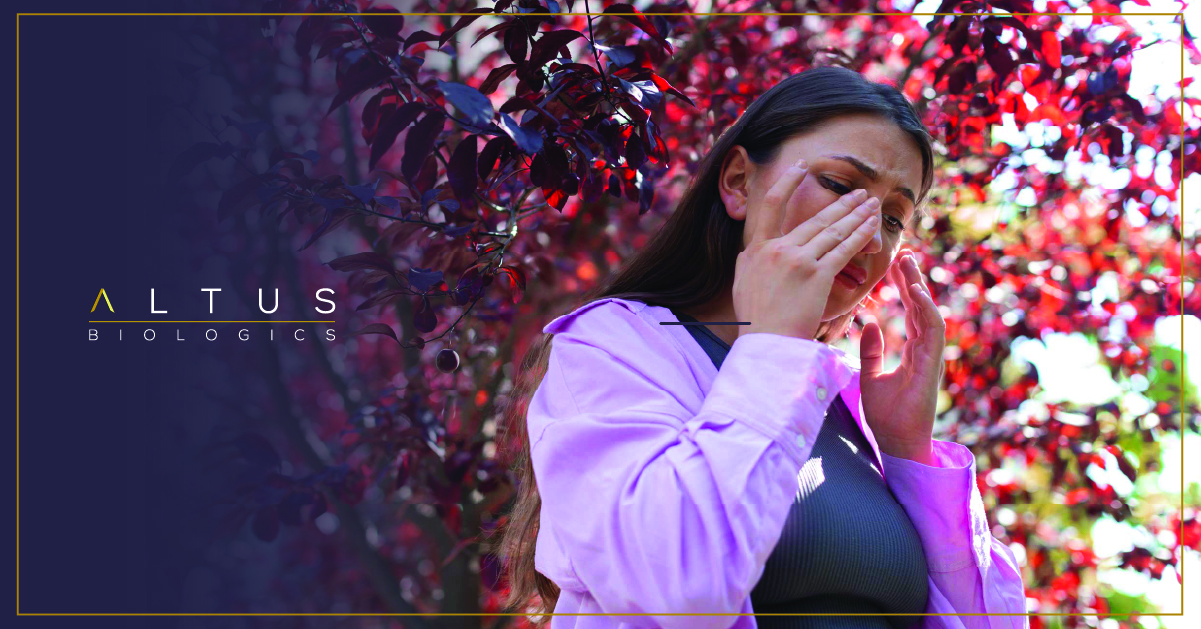Fall Allergies or Something More? Understanding Chronic Sinusitis and Biologic Treatment Options
As the crisp air of fall rolls in, so do ragweed, mold spores, and other seasonal allergens that can leave you sneezing, congested, and reaching for tissues.
If you’ve noticed that your symptoms seem to drag on long after allergy season or don’t respond to your usual allergy medications, you might be wondering: Is this really fall allergies, or something more?
Seasonal Allergies vs. Chronic Sinusitis
Fall allergies are triggered by factors such as ragweed pollen, mold from damp leaves, and dust stirred up as you spend more time indoors.
Typical symptoms include:
- Sneezing
- Runny or stuffy nose
- Itchy, watery eyes
- Scratchy throat
These symptoms usually flare during high pollen counts or after exposure to allergens and improve once the season passes or you avoid triggers.
Chronic rhinosinusitis with nasal polyps (CRSwNP), on the other hand, is a longer-lasting condition.
It’s not just about pollen or weather; it’s an ongoing inflammation in your sinus passages that persists for 12 weeks or more, even with standard treatments.
Symptoms often include:
- Persistent nasal congestion and blockage
- Facial pressure or pain
- Thick nasal discharge
- Reduced or lost sense of smell
- Frequent sinus infections
Unlike allergies that come and go, CRSwNP can feel like you’re stuck in an endless cycle of sinus misery.
Why Your Allergies Might Actually Be Chronic Sinusitis
It’s natural to assume your congestion and runny nose are just seasonal allergies, especially in the fall, when pollen, mold, and dust are everywhere.
But if you notice that your symptoms linger well beyond allergy season, don’t fully respond to antihistamines, or are accompanied by facial pain and a reduced sense of smell, there may be more going on.
Chronic rhinosinusitis with nasal polyps (CRSwNP) often gets mistaken for stubborn allergies because the symptoms overlap. The key difference is that allergy symptoms come and go, while CRSwNP tends to stick around for 12 weeks or more, creating an ongoing cycle of inflammation that disrupts your daily life.
Recognizing this distinction matters. If your “allergies” never seem to let up, you could be dealing with chronic sinusitis, a condition that requires more than over-the-counter medications or seasonal fixes.

Traditional Treatment Approaches
If you’ve been dealing with sinus symptoms, your doctor may have already recommended options such as:
- Nasal corticosteroid sprays to reduce inflammation
- Saline rinses to flush out allergens and irritants
- Antibiotics (if bacterial infections occur)
- Steroid medications for flare-ups
These treatments can bring temporary relief, but for many people, the symptoms return, and sometimes worse than before. That’s where newer options like biologic therapies come in.
Biologic Therapies: A New Era of Relief
Biologics are advanced medications designed to target the underlying inflammation that causes CRSwNP. Unlike traditional treatments that only manage surface symptoms, biologics work at the immune system level to calm the overactive response driving your sinus problems.
If you’ve tried nasal sprays, antibiotics, or even surgery without lasting success, biologics may offer a more effective long-term solution.
These treatments are usually given by injection under the guidance of your healthcare provider. They can significantly reduce polyp size, improve breathing, restore your sense of smell, and reduce the need for surgery or steroids.
Practical Tips for Managing Fall Symptoms
While you work with your provider to determine the root of your sinus issues, there are also steps you can take to feel better during high-allergen seasons like fall:
- Check pollen counts daily and limit outdoor activity when levels are high.
- Shower and change clothes after spending time outdoors to remove pollen.
- Use a HEPA air filter in your bedroom to reduce indoor allergens.
- Stay hydrated to keep mucus thin and easier to clear.
- Try saline nasal rinses to wash away irritants before they cause inflammation.

When to Talk to Your Provider
It’s time to schedule a conversation with your doctor and discuss biologic therapy if your symptoms:
- Last more than 12 weeks.
- Don’t improve with standard allergy treatments.
- Include loss of smell, severe congestion, or recurrent sinus infections.
You may be dealing with chronic sinusitis rather than just seasonal allergies, and biologic therapy could be the breakthrough you’ve been waiting for.
You deserve to breathe freely, enjoy fall activities, and live without the constant frustration of congestion, sinus pressure, or a lost sense of smell.
If your “allergies” never seem to let up, don’t ignore them. Talk to your healthcare provider about whether biologic therapies for chronic rhinosinusitis with nasal polyps might be right for you.
Relief is possible, and you don’t have to face another season of suffering.
